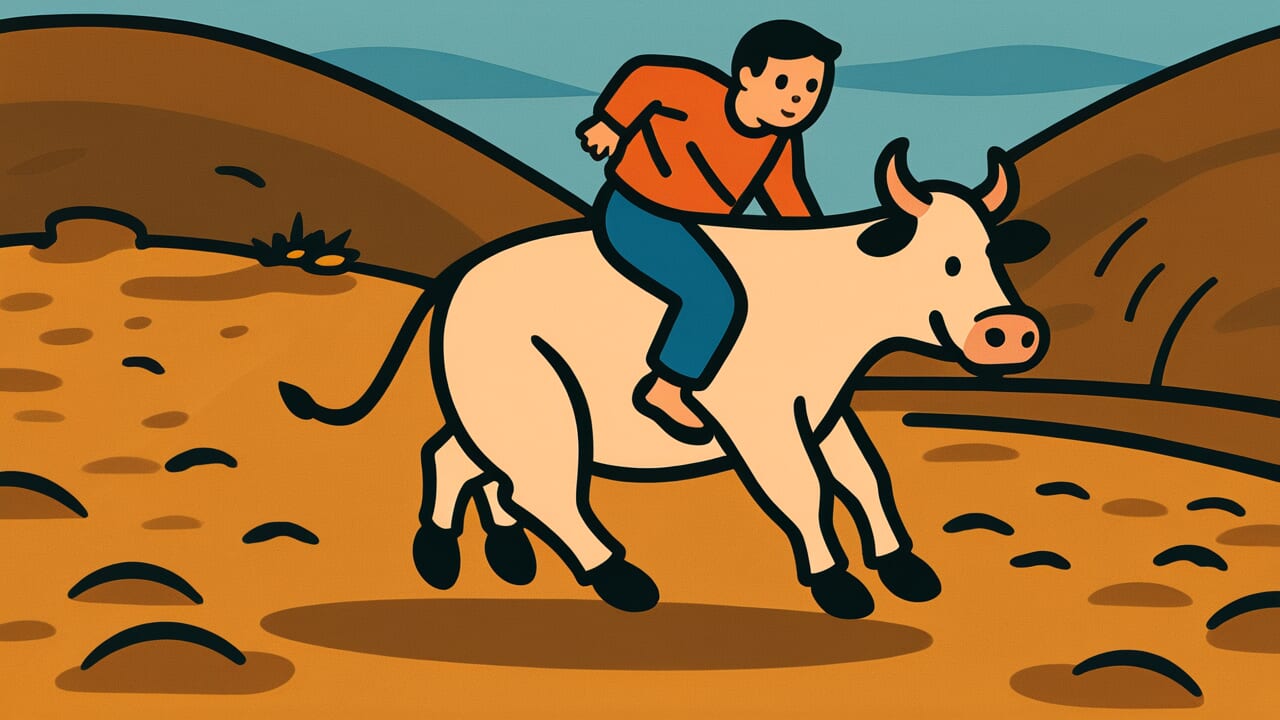How to Read “Searching for an ox while riding an ox”
Ushi ni notte ushi wo tazuneru
Meaning of “Searching for an ox while riding an ox”
“Searching for an ox while riding an ox” is a proverb that describes the foolishness of looking for something you already have or are currently using without realizing it.
The contradiction of riding a large animal like an ox while searching for that very ox shows how absurd it is when we don’t notice our own situation.
In everyday life, this proverb applies to situations like searching for your glasses while wearing them, or looking for your phone while talking on it.
It also warns people who already have sufficient talent or favorable circumstances but fail to recognize this and keep seeking ideals far away.
This expression sharply points out a human blind spot. What we’re looking for is actually right beside us, or already in our hands, yet we fail to notice it.
Origin and Etymology
This proverb is believed to originate from the teachings of Chinese Zen Buddhism.
In the Zen world, there’s a phrase “kigyū bekigyū,” which means “searching for an ox while riding an ox.” This Zen expression came to Japan and became established as “Searching for an ox while riding an ox.”
In Zen teachings, the ox symbolizes enlightenment, truth, or one’s true self.
When practitioners try to go far away to seek enlightenment, the teaching reminds them that enlightenment already exists within themselves. The ox metaphor expresses this idea beautifully.
Riding an ox means you’ve already obtained what you’re seeking.
In Japan, this Zen teaching spread as a common proverb. It became an expression that warns against foolish behavior in daily life.
People use it to describe comical situations everyone experiences, like searching for glasses while wearing them or looking for something you’re holding.
The profound Zen teaching continues to live on as a familiar lesson in our lives.
Usage Examples
- Making a fuss about not having your wallet while holding it is exactly like searching for an ox while riding an ox
- I was looking for happiness far away, but when I realized it was in my daily life with family, I felt embarrassed for searching for an ox while riding an ox
Universal Wisdom
The proverb “Searching for an ox while riding an ox” points out a fundamental human blind spot.
We often become unable to see what’s closest to us. Why does this happen? It’s because human consciousness naturally focuses on “what we don’t have” and “what we lack.”
What we already possess becomes taken for granted and pushed outside our awareness.
When we’re healthy, we don’t appreciate our health. We only recognize its value after losing it. When loved ones are near, we take their presence for granted. We realize their importance only after they’re gone.
This is an essential characteristic of human nature.
Looking deeper, this proverb questions our attachment to “searching” itself.
We feel we’re making progress by seeking something. However, we become so absorbed in the act of searching that we lose sight of what we already have.
This contradiction is both the absurdity and the endearing quality of being human.
Our ancestors understood this human trait well. That’s why they used such a visual and memorable metaphor of riding a large ox while searching for it.
They wanted to give us awareness through this striking image.
When AI Hears This
When the human brain creates an image of “what we’re searching for,” it automatically filters out anything that doesn’t match that image.
For example, psychologist Daniel Simons conducted an experiment. Participants focused on counting basketball passes. About half of them didn’t notice a person in a gorilla costume walking right through the scene.
This is called inattentional blindness.
What’s interesting about this proverb is that in the brain of someone searching for an ox, a search-mode mental image forms of “an ox far away” or “a lost ox.”
The brain uses limited attention resources efficiently. It creates a filter that includes not just the target’s features (four legs, horns, large size) but also situational features (located somewhere distant, must be found).
The situation of “currently riding it right now” falls completely outside this filter.
What’s even more fascinating is that sensory information about riding the ox does enter the brain. But the search-mode prefrontal cortex processes that information as “irrelevant background noise.”
The sensory organs are functioning correctly. But the brain’s information processing system becomes too optimized for the purpose of “searching.” Ironically, this makes the answer invisible.
This is a paradox where the brain’s strategy to increase search efficiency becomes the biggest obstacle.
Lessons for Today
This proverb teaches us the importance of stopping to look at what’s right beneath our feet.
We constantly seek new things and search for better options. But in our obsession with this quest, aren’t we overlooking the treasures we already hold?
Modern society continuously stimulates our desire for “more and more.”
On social media, we see others’ glamorous lives. We become preoccupied with what we lack. But try looking at the abilities you already have, the relationships you’ve built, and the small daily joys.
You might realize that what you were searching for was right beside you all along.
The point isn’t to stop seeking new things. It’s to develop a habit of pausing before searching to check what’s already in your hands.
If you move forward after doing this, you won’t take unnecessary detours. You’ll be able to identify what you truly need.
After all, the ox of your life is already beneath your feet.



Comments